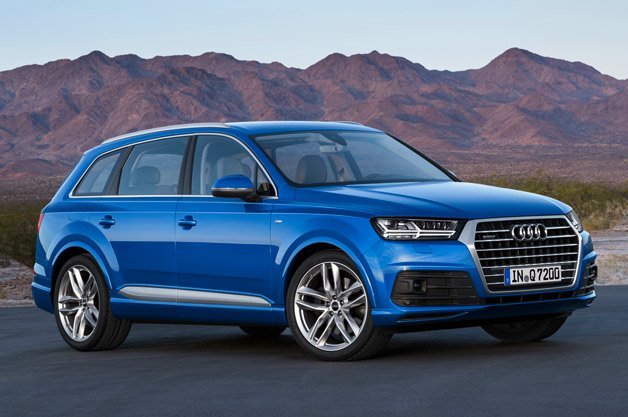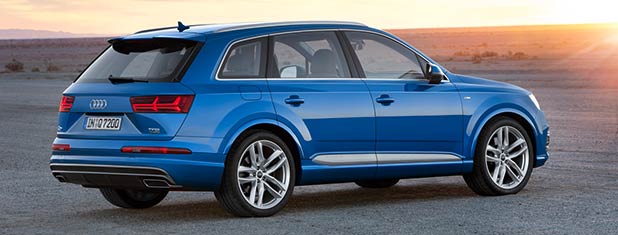Next-Gen Audi Q7 Shows of its Wares Ahead of Detroit

After all, it was easily the oldest vehicle in the Audi range, having hit the market way back in 2006. But with this new model, Audi has comprehensively updated its fullsizer, adding some cutting-edge tech, updating some classic engines, and taking a whole lot out.
As is the theme nowadays, particularly among large crossovers and SUVs, Audi has put the Q7 on a massive diet with a mix of ultra-high-strength, hot-shaped steel and aluminum, trimming over 700 pounds of body fat and lowering the Q7's weight to just under 4,400 pounds. This was accomplished while maintaining virtually identical dimensions to the current model.

While Audi USA hasn't released its info on the Q7, the Euro-spec model will continue to offer a pair of engines that should be very familiar to US consumers, with a 3.0-liter, supercharged V6 gas engine and a 3.0-liter TDI V6.
The 3.0-liter TDI has been bumped up from 240 horsepower to 272 ponies, while torque is up from 406 pound-feet to 443. This extra grunt has trimmed the 0-60 time from a leisurely 7.3 seconds down to 6.3, while the fuel economy has jumped up to 41.3 US miles per gallon, converted from the European cycle (so expect the EPA numbers to be a bit lower).
The supercharged 3.0-liter, meanwhile, has been amped up to match the output of its application in the S4 sport sedan, jumping from 280 hp and 295 lb-ft to 333 ponies and 325 lb-ft. Once again, the 0-100 time falls dramatically thanks to the power bump and weight loss, dropping from 7.7 seconds to a far more zippy 6.1.
The most exciting news is the long-rumored arrival of the Q7 E-Tron, a plug-in hybrid that's mated to a six-cylinder diesel engine and Quattro all-wheel drive. Audi claims this world-first production powertrain will return 138.4 US miles per gallon, emit less than 50 grams of CO2 per kilometer and allow the Q7 E-Tron to travel up to 56 km on electric power alone. The combo of the 258-hp diesel V6 and 94-kilowatt electric motor blesses the big PHEV with a total system output of 373 hp and peak torque of 516 lb-ft. In fact, Audi says the Q7 E-Tron can hit 100 km/h in just 6.1 seconds on electric power alone (the normal 0-100 time is six seconds flat).
In addition to the three aforementioned means of motivation, Audi will offer its European customers, at least, a lower-output variant of the 3.0-liter diesel, as well as a version of the fullsize CUV with the ubiquitous 2.0-liter, turbocharged four-cylinder.
Diesel, gas and E-Tron powertrains will be fitted with a new eight-speed automatic and Quattro all-wheel drive, which will offer a new, lightweight automatically locking center differential that's actually integrated with the transmission. With the help of torque vectoring, Quattro can dispatch up to 85 percent of the engine's power to the rear axle and 70 percent to the front.
The Q7's new cabin expands on the clean, fashionable stylings we've come to expect from Audi. The dash looks like an evolved form of that found on the Audi A6, A7 and A8, with a pop-up navigation screen crowning a center that's somewhat short and light on controls, aside from the HVAC systems. Taking a page from the book of the new TT, the Q7 will feature a 12.3-inch TFT "virtual cockpit" that replaces traditional dials.
Orders will open for German Q7 customers in the spring, with deliveries slated to begin this summer. German-market prices will start at 61,000 euros (around $76,000 at today's rates).


